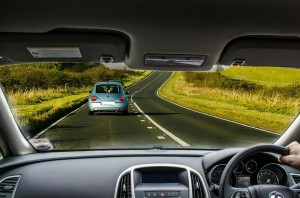Wheeling Charity

By Sunehra Mehmood
There are cars driven by professional drivers, women, and yes, children. You must have seen those triflingly small inhabitants of the earth handling cars light years bigger than themselves, without a care in this world, putting themselves and others at risk while their parents snore away. On the other hand, some cars are driven by professional drivers, who butter their bread by driving as if they are rushing to put out a fire. Then, there are women drivers who are disparaged far and wide for being bad drivers. That’s just a myth. Don’t believe a word of it. The only difference between women drivers and others is that they drive like educated people whereas the others, well, not so much. The fact that I myself am a driver and female is purely coincidental and not at all prejudicial.
A common sight on the roads are the technicolor monstrosities that rumble around carrying their burden, panting and shuddering, complete with a conductor precariously perched on his appointed place by the door, whose one half dangles joyously out in the wind with the exposed hand tightly holding on to a wad of money. These road elephants have their own laws, which they make and break with impunity. They move at their own pace, braying hideously, and stop wherever they very well please, which is most likely not at a bus stop, pick up passengers and remember to take their sweet time about it. Incidentally, when they drop off these same passengers, they hardly wait long enough to see if the passengers’ feet have touched the ground or not.
Motorcyclists and rickshaw walas are the most uncharitable of the lot. They would rather see you in the underworld (quite literally actually) then let you pass first, so don’t waste your indicators at them. They would hardly glance at them and if they do, they would be astonished to know that the blinking light was meant to convey a message to them. Rickshaw walas, in particular, don’t drive, they glide as if on air and their peculiarities include going wrong way on a one-way. They would rather face death or worse, a challan, then waste their gas and go the lawful way. The motorcyclists, on the other hand, accommodating souls that they are, can be seen sailing by on motorcycles laden with all the inmates of their house plus a few of the neighbour’s kids as well, changing lanes like there’s no tomorrow, and not even sparing footpaths. They would blur past you as if it was their divine right to do so, without so much as a penitent backward glance. And if, God forbid, you were so incredibly unfortunate as to collide with them and unintentionally be the cause of totalling their vehicle, then they would charge up to you with a host of colourful language, and if you do get a word in edgewise, they would vehemently disagree with your quite rightful accusation that it was their mistake in the first place. So, why waste your breath, instead just keep a wide breadth from them.
Traffic police are few and far between. They may not be thin physically but they are stretched thin on the busy roads, where they are most needed. They may be notorious for taking bribes and other such irregularities, but in the spirit of charity, we should cut them some slack. Can you imagine yourself standing in the heat, surrounded by dust and fumes, trying to direct traffic when each of us is hell-bent on getting out of it legally or illegally? Imagine what humongous headaches they must get from all that noise. Now, on to traffic signals, which just stand where they are, looking pretty and doing nothing, especially not what they are supposed to do. Only a few of them sport any colour, while the rest appear to be in mourning.
Man-holes are an interesting creation, particularly if they are placed in the middle of the road. Their cover, for some reason, bulges upwards and outwards and one’s sure that there must be a perfectly good scientific explanation for it but to the naked eye it looks plain useless and quite annoying when one has to avoid them like a chore. And talk of their cousin, the speed breakers. They used to be of manageable heights but now they are getting increasingly taller and wider, so it takes extra effort to mount them. Also, there are other kinds of things that you’ll find on the roads, which you can either view as decoration pieces to beautify the streets or, conversely, as a warning to the unsuspecting driver. They are, indeed, man-holes that are not suitably covered as man-holes are wont to be; instead tree branches or palm fronds protrude out of them, no doubt the work of some generous soul to sufficiently attract the driver’s eye and prevent him from lodging his tyre in the hole. Other bumps and holes made by rain and such are nature’s way to test the mental and physical agility of the driver as he tries in vain to avoid them and bring the minimum of discomfort to the passengers.
 Pedestrians defy understanding and the rules governing road sense. When seeing them live in action, one finds oneself unshakably in possession of the idea that they are, perhaps, suicidal. Why else would you try to cross a busy main road with such sublime equanimity? But perhaps people walking on smaller lanes contribute much more towards giving the driver a migraine. It’s common knowledge that these special kind of pedestrians actually hold the belief that roads are meant for them to walk on. And one particular street that I frequent is scattered with human zombies who keep on walking even after I half strain my arm honking.
Pedestrians defy understanding and the rules governing road sense. When seeing them live in action, one finds oneself unshakably in possession of the idea that they are, perhaps, suicidal. Why else would you try to cross a busy main road with such sublime equanimity? But perhaps people walking on smaller lanes contribute much more towards giving the driver a migraine. It’s common knowledge that these special kind of pedestrians actually hold the belief that roads are meant for them to walk on. And one particular street that I frequent is scattered with human zombies who keep on walking even after I half strain my arm honking.
In a big city like Karachi, there is no lack of parking space. You can park your car every which way, in two or three rows behind already parked cars. Indeed, you can even park on the road. And houses whose owners did not have the foresight to imagine that they were building their houses right where a few decades down the road (pun intended) a palpitating market-place would emerge have to sport a ‘do not park in front of the gate’ sign. Then, there are individuals, sanctioned by the government, present at virtually every makeshift parking space, demanding any amount between 10 to 30 rupees in exchange for the privilege to park. They’ve become quite commonplace, haven’t they? We hate them, we abuse them, we try to escape unnoticed, but in the end, pay the fee. But the other day, having too much time on my hands waiting for my mother to finish her grocery shopping, an inadvertent glance at the parking receipt led to illumination of the most treacherous kind. One of the conditions listed on the receipt was, ‘Owner parks at his risk’. Even a person in possession of an otherwise calm demeanour must feel an uncontrollable and highly inappropriate urge to do something drastic to the person who collects the money.
The young and enthusiastic, who have just learned to drive must be familiar with a scary presence in their car. That presence is, most often than not, characteristically female and sits in the most uncomfortable manner in the front passenger seat, prophesies a horrible accident every so often, and calls all the shots. She is not there to haunt you, in fact, she’s scared herself. She is your mother, and she is the worst thing that could happen to a newbie driver. She may never have driven a car herself but she is so learned in that particular art that she’ll tell you to stop the car if there is another one approaching from the far opposite end of the lane. Don’t worry, though, this is a rite of passage that most young drivers must go through. Speaking from personal experience, it gets better with time, slightly.
Once in a blue moon, if you’ve been extra good and have completed all your chores and haven’t been guilty of back-biting against your boss for a while, then you may be rewarded with a glimpse of that rarest of species, the one that practices charity while driving. But how will you recognize that model citizen? Simple, if you’re ever waiting at an opening in the road hoping to come onto the road running parallel to the one you’re on but are detained by a long strand of cars that won’t give you the time of day, this one specimen of charitable conduct will stop to let you pass. If you have ever been on the receiving end of charity on wheels, consider yourself blessed, because the next time you’re in a similar situation, that chivalrous being may not stop for you for he may have learned his lesson that letting you pass also means letting the throng of cars behind you pass as well.
Those older and wiser than us have said that charity begins at home but they were speaking of an age in which motor-vehicles were not yet invented, and, hence, could be forgiven for not foreseeing that that extremely scarce commodity would become just as necessary on the roads. Indeed, if you’re a first-time driver, or from foreign parts, or just a plain old homebody who seldom risks the roadways, then go wheeling at your own discretion. But whenever you do happen to be driving always remember what my father, a nonpareil, used to say, ‘drive as if everyone else on the road is blind and you’re the only one with eyes’.





